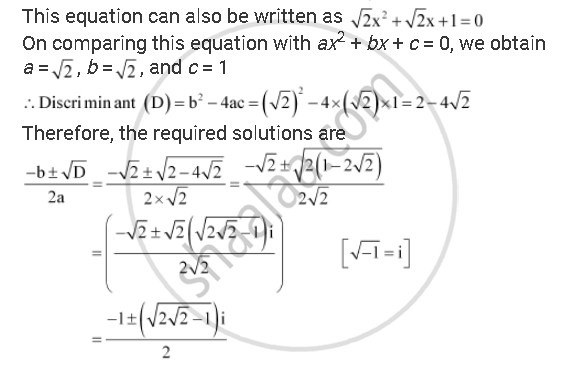Advertisements
Advertisements
प्रश्न
Solve the equation `x^2 + x + 1/sqrt2 = 0`
उत्तर
The given quadratic equation is `x^2 + x + 1/sqrt2 = 0`

APPEARS IN
संबंधित प्रश्न
Solve the equation –x2 + x – 2 = 0
Solve the equation x2 – x + 2 = 0
Solve the equation `sqrt3 x^2 - sqrt2x + 3sqrt3 = 0`
Solve the equation 21x2 – 28x + 10 = 0
If z1 = 2 – i, z2 = 1 + i, find `|(z_1 + z_2 + 1)/(z_1 - z_2 + 1)|`
\[x^2 - 4x + 7 = 0\]
\[21 x^2 + 9x + 1 = 0\]
\[17 x^2 - 8x + 1 = 0\]
\[8 x^2 - 9x + 3 = 0\]
\[13 x^2 + 7x + 1 = 0\]
\[x^2 + \frac{x}{\sqrt{2}} + 1 = 0\]
\[- x^2 + x - 2 = 0\]
\[x^2 - 2x + \frac{3}{2} = 0\]
Solve the following quadratic equation:
\[x^2 + 4ix - 4 = 0\]
Solve the following quadratic equation:
\[x^2 - \left( \sqrt{2} + i \right) x + \sqrt{2}i = 0\]
Solve the following quadratic equation:
\[2 x^2 - \left( 3 + 7i \right) x + \left( 9i - 3 \right) = 0\]
If roots α, β of the equation \[x^2 - px + 16 = 0\] satisfy the relation α2 + β2 = 9, then write the value P.
If \[2 + \sqrt{3}\] is root of the equation \[x^2 + px + q = 0\] than write the values of p and q.
If the difference between the roots of the equation \[x^2 + ax + 8 = 0\] is 2, write the values of a.
If a and b are roots of the equation \[x^2 - x + 1 = 0\], then write the value of a2 + b2.
Write the number of quadratic equations, with real roots, which do not change by squaring their roots.
If α, β are roots of the equation \[x^2 - a(x + 1) - c = 0\] then write the value of (1 + α) (1 + β).
If a, b are the roots of the equation \[x^2 + x + 1 = 0, \text { then } a^2 + b^2 =\]
If α, β are the roots of the equation \[x^2 + px + 1 = 0; \gamma, \delta\] the roots of the equation \[x^2 + qx + 1 = 0, \text { then } (\alpha - \gamma)(\alpha + \delta)(\beta - \gamma)(\beta + \delta) =\]
The number of real solutions of \[\left| 2x - x^2 - 3 \right| = 1\] is
The number of solutions of `x^2 + |x - 1| = 1` is ______.
If x is real and \[k = \frac{x^2 - x + 1}{x^2 + x + 1}\], then
If the roots of \[x^2 - bx + c = 0\] are two consecutive integers, then b2 − 4 c is
The value of a such that \[x^2 - 11x + a = 0 \text { and } x^2 - 14x + 2a = 0\] may have a common root is
The number of roots of the equation \[\frac{(x + 2)(x - 5)}{(x - 3)(x + 6)} = \frac{x - 2}{x + 4}\] is
If α, β are the roots of the equation \[x^2 + px + q = 0 \text { then } - \frac{1}{\alpha} + \frac{1}{\beta}\] are the roots of the equation
If α, β are the roots of the equation \[x^2 - p(x + 1) - c = 0, \text { then } (\alpha + 1)(\beta + 1) =\]
Find the value of a such that the sum of the squares of the roots of the equation x2 – (a – 2)x – (a + 1) = 0 is least.
Show that `|(z - 2)/(z - 3)|` = 2 represents a circle. Find its centre and radius.
